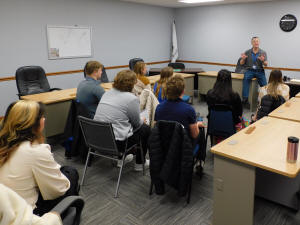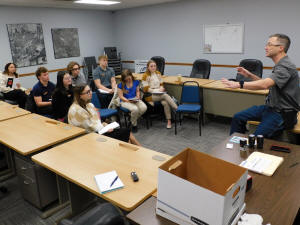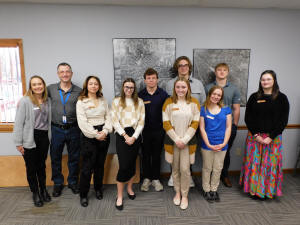|
 This
year there are eight students participating in the LLCEO. They are
Peyton Bunner, Adalyn Reed, Finley Hewitt, Cheyenne Medrano, Kyle
Koehler, Ivy Sandel, Alek Claudio, all students of Lincoln Community
High School and Kennedy McCree, a student at Hartsburg-Emden High
School. This
year there are eight students participating in the LLCEO. They are
Peyton Bunner, Adalyn Reed, Finley Hewitt, Cheyenne Medrano, Kyle
Koehler, Ivy Sandel, Alek Claudio, all students of Lincoln Community
High School and Kennedy McCree, a student at Hartsburg-Emden High
School.
McCoy opened the day interacting with the students by asking them
what their long-term career goals are. The answers varied from
heading to college after high school then entering into a variety of
career choices including business, becoming an attorney,
orthodontist, and pursuing a career in animation. Two students said
they would pursue businesses they have already started, and one
student intended to attend a specialized trade school and become an
electric lineman.
The second question to the students was why they had chosen to take
the LLCEO program. Answers ranged for a desire to learn more about
business, to learn more about communication and networking and
earning dual credits for college. It was also mentioned that when
making college applications as well as work applications, being a
student of the CEO programs looked good on a resume.


McCoy noted that all of the students had spoken of
higher education in college or trade schools. He said that education
was a very good thing, but at the same time, life experiences are
highly valuable. He said he personally did not have a college
degree, but his wife is a highly educated professional working in
education.
McCoy said he had grown up in Pontiac, but in recent years he and
his wife moved to Bloomington for her work. He said that he had
served as the mayor of Pontiac for a time, and during that time, had
worked with the city to make that community a Route 66 tourist
destination. Now, McCoy is serving more or less as a consultant for
the city of Atlanta, working with them to increase traffic into the
community by exploiting the Route 66 connection in the town to its
fullest extent.
McCoy explained that Route 66 is a national highway that runs from
Chicago west to California. He said that in the majority of cases,
tourists begin their road trip on Route 66 in Chicago, putting
Illinois in the early stages of the tour. He said this was important
information because when the trip starts is when travelers have the
most money in their budget for their trip. The goal then has to be
to set up communities to attract visitors and offer not just places
to “drive by” and shoot photos. Visitors need to be drawn to stop,
get out of their cars and into local attractions and businesses.
McCoy said Pontiac was not actually on Route 66, so the town had to
create its own connection. Fortunately there was historical proof
that for a very short period of time, Route 66 had been diverted
through Pontiac while road construction was underway on the Mother
Road. Because of this, the town could declare that they had a Route
66 designation albeit temporary.

The first big opportunity for Pontiac came in the
form of the large mural that is very popular in the town. A mural
depicting Route 66 that has an area where people can park and take
photos of themselves and their vehicles in front of the mural has
been very successful. McCoy said it started slow. When he started
marketing Route 66 in Pontiac it was estimated that there were zero
stops in the community because of the highway. In the first year
after the mural installation the estimate grew to 17,000. Today,
McCoy said Pontiac gets around 100,000 visitors per year thanks to
marketing the community as a Route 66 attraction, and it is the
third largest tourist destination in Illinois.
Like Pontiac in the early years, McCoy said Atlanta and Lincoln are
both undermarketed as Route 66 destinations. He is working with the
city to increase the visibility of Atlanta and is enjoying some
success. He added that bringing more people into Atlanta is having a
positive impact on economic development and noted that there have
been at least three to four new businesses come to town because of
it.
He told students that Atlanta and Lincoln have another good thing
going for it. For those who start their journey in Chicago, their
first day stop is going to come in Logan County. That equates to
motel stays visits to restaurants, and some local shopping. He said
all this needs to be promoted so that tourists will know that their
first stop is going to be a Route 66 stop worth making. He noted
that Atlanta has one motel that recently went under new management
and has been redecorated with a Route 66 theme that is making it a
destination in its own right.
McCoy said that the animated movie “Cars” did a lot for Route 66
because if you pay attention, the movie is Route 66 with all the
stops being locations along the Mother Road. He said that the
traffic on the route has increased substantially. So, getting the
people to stop is the key. One method of doing this is through a
passport system that draws visitors into the communities to get
their “passport stamped.” Atlanta participates in several such
passports including one McCoy has created personally via his side
business of promoting Route 66 on the whole.
[to top of second column] |

He said that Atlanta has several stamp opportunities
including the sites and several of the businesses. The businesses in
town are also working together in the passport program by urging
visitors to collect more stamps by directing them to others in town
who are on the stamp list.
McCoy said that Route 66 is a worldwide attraction with hundreds of
thousands of visitors coming from foreign countries. He asked the
students to guess what country has the most people traveling Route
66. Students threw out several answers, but McCoy said that the two
top countries in the world with populations visiting Route 66 were
Australia and New Zealand.

Asked why Route 66 is so attractive, he said that
Route 66 is an all-inclusive piece of Americana. He said that along
Route 66, tourists experience big cities, small towns, agriculture,
industry, rivers, mountains, deserts and the ocean. They see
livestock and wildlife, and things that baffle them, such as grain
elevators. He noted that the Atlanta grain elevator is in the heart
of town, and one of the more commonly asked questions at the
American Giants Museum is “What is that there?” referring to the
elevator grain bins.
McCoy said that marketing Route 66 is not a priority locally because
it is promoted by the state. So the priority becomes marketing the
unique aspects of the community. He said Atlanta has unique aspects
pertaining to Route 66 because in has two alignments, but what is
going to attract visitors are the things that are unique to the
community such as the museums that are focused on not just Route 66
but also other historic aspects. He noted the American Giants Museum
as one such marking tool as well as the recently opened coal mine
museum.

In addition he said local or regional marketing was
targeted in the appropriate time of year. He said the typical
tourist season in this area is April to October. Therefore that is
the time when museums are open, and Route 66 stops are promoted. He
said that it is target marketing.
McCoy said it is important to have what is wanted and needed when it
is wanted and needed. There is no need to have Route 66 attractions
open in the off season as the overhead costs to open the locations
are not justified.
He said this was like something known as the “hurricane technique.”
He said in the south during hurricane season Walmart loads in
massive supplies on one product in particular. He asked students to
take a gander at what that product might be. Students named off
practical items such as bottled water, toilet paper, bread and milk.
All good guesses McCoy said but no. The number one product
overstocked in Walmart during hurricane season is strawberry pop
tarts.
He said pop tarts are a self-contained product with a long shelf
life that can be eaten straight from the package. They are wrapped
in sets of two so what is not unwrapped remains fresh. McCoy said
that is the crux of marketing; determining what people will want and
need and when they will want and need it.
McCoy went on to talk a bit about his side business and how he
utilizes artificial intelligence (AI) and applications to draw
traffic to his website which is Route 66 focused. He also spoke
about using AI in interpretation tools. He said he had an earpiece
he can use to hear instant translations from a foreign language to
one he understands. And he also gives an earpiece to the visitor
he’s conversing with that will translate his words into a language
they understand. He said there are also phone aps that do the same
thing and those are utilized as well.
At the end of the visit, he opened the floor for questions and was
asked about his term as mayor in Pontiac. He said he was somewhat of
an accidental mayor. There had been a dust up between the city
government and constituents because of some inappropriate pay
changes for government officials. He said the community had turned
out in force to protect and McCoy had been among them and had been
quite verbal at the meeting. Afterward, someone in the crowd
suggested he run for mayor. He said he considered it, decided to
run, did not expect to win, but did.
Once he was in office, he said he was fully involved and that it had
been a time when the Pontiac community had taken some hard hits
including a big flood event. McCoy himself went to Washington D.C.
and fought for recognition as a community deserving of disaster
relief. He explained that the Federal Emergency Management Agency
and the Illinois Emergency Management Agency had denied Pontiac’s
application saying the community damage was “too small” and did not
warrant assistance. McCoy said he worked to get that assistance and
succeeded, making the community of Pontiac the smallest claim on
record with FEMA and IEMA.

From the left LLCEO
facilitator Sarah Tomaszewski, McCoy, Cheyenne Medrano, Ivy Sandel,
Kyle Koehler, Finley Hewitt (front), Alek Claudio (back), Kennedy
McCree (front), Peyton Bunner (back) and Adalyn Reed.
With class time nearing its end, McCoy gave each of
the students a souvenir lapel pin, then the group posed for a photo
op before heading out to their respective high schools to start
their normal class day.
[Nila Smith] |